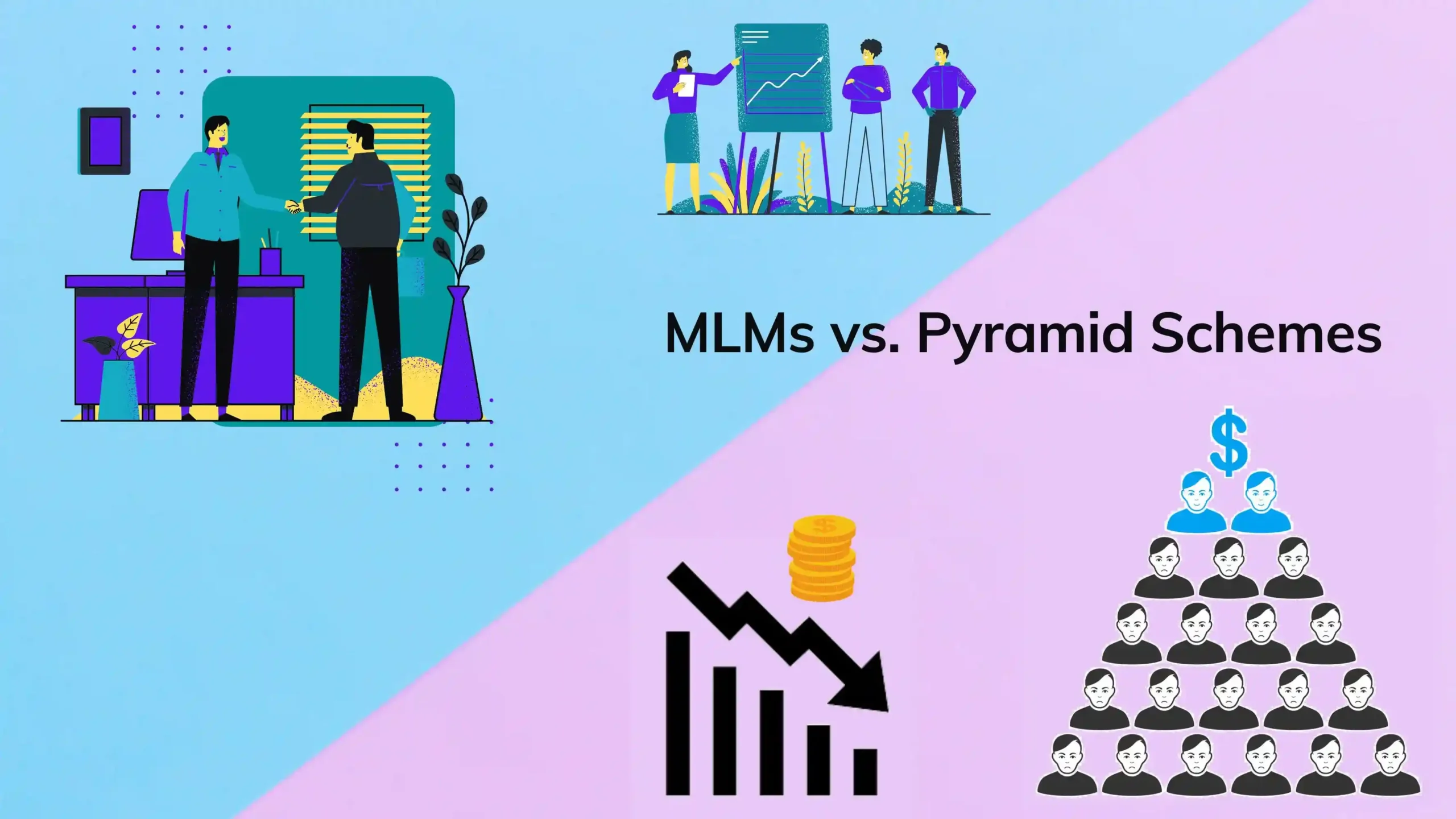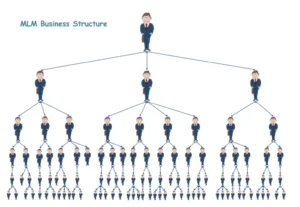Multi-level marketing and pyramid scheme are two business models often associated with each other, yet they are fundamentally different in nature. While MLM is a legitimate business model focused on selling products or services through a network of distributors, pyramid schemes are illegal scams that primarily generate revenue by recruiting new participants rather than selling products or services.
In this article, we will explore the distinctions between Multi-level marketing and pyramid scheme, examining their structures, practices, and implications for participants and the broader business community. Understanding these differences is crucial for individuals considering involvement in MLM or evaluating the legitimacy of business opportunities.
Structure and Operation Multi-level marketing and pyramid scheme

Multi-level marketing and pyramid scheme have distinct structures and operations that differentiate them from each other.
Multi-Level Marketing (MLM) Structure
Focus on Selling Products or Services
- MLM companies primarily generate revenue through the sale of genuine products or services to consumers.
- Participants earn commissions based on their sales volume and the sales volume of their downline organization.
Hierarchical Distribution Network
- MLM operates through a hierarchical distribution network, where participants recruit new distributors and build a team.
- Participants earn commissions not only from their own sales but also from the sales made by their recruited distributors and their recruits.
Compensation Based on Sales Volume
- MLM compensation plans typically reward participants based on their ability to generate product sales and build a successful team.
- Commissions are often tied to sales volume, with higher sales resulting in greater earning potential for participants.
Pyramid Scheme Structure
Emphasis on Recruiting Participants
- Pyramid schemes prioritize recruiting new participants over selling products or services.
- Participants are incentivized to recruit others into the scheme with promises of high returns for their recruitment efforts.
Promise of High Returns for Recruiting Others
- In pyramid schemes, participants are often promised significant financial rewards for recruiting new members into the scheme.
- These rewards are typically based on the recruitment efforts of downline participants, rather than the sale of legitimate products or services.
Lack of Genuine Products or Services
- Pyramid schemes may lack genuine products or services of value to consumers.
- Revenue generated in pyramid schemes primarily comes from membership fees or investments made by new recruits, rather than the sale of tangible goods or services.
In summary, while MLM operates through a legitimate business model focused on product sales and building a distribution network, pyramid schemes rely on recruiting new participants with the promise of financial rewards, often without offering genuine products or services. Understanding the differences in structure and operation is crucial for distinguishing between legitimate Multi-level marketing and pyramid scheme.
Licenses For Multi Level Marketing
Legality and Compliance
Multi-level marketing and pyramid scheme are subject to different legal and regulatory frameworks, reflecting their distinct business models and practices.
Legitimacy of MLM
Regulation by Government Agencies
- MLM companies operate within the legal framework established by government agencies, such as the Federal Trade Commission (FTC) in the United States.
- Regulatory bodies set guidelines and requirements for MLM companies to ensure compliance with consumer protection laws and fair business practices.
Compliance with Laws and Regulations
- Legitimate MLM companies adhere to laws and regulations governing deceptive advertising, income claims, product quality, and recruitment practices.
- Compliance with legal requirements is essential to maintain the legitimacy and credibility of MLM businesses and protect the interests of consumers and distributors.
Ethical Business Practices
- MLM companies strive to uphold ethical business practices, including transparency, honesty, and integrity in their dealings with distributors and consumers.
- Ethical conduct is essential for maintaining trust and confidence in the MLM industry and mitigating the risk of regulatory scrutiny or legal challenges.
Illegality of Pyramid Schemes
Prohibition by Law
- Pyramid schemes are illegal in many jurisdictions due to their exploitative nature and deceptive practices.
- Laws explicitly prohibit pyramid schemes and classify them as fraudulent schemes designed to enrich early participants at the expense of later recruits.
Focus on Recruiting Rather Than Selling
- Pyramid schemes primarily generate revenue through the recruitment of new participants, rather than the sale of legitimate products or services.
- The emphasis on recruitment over product sales is a key characteristic that distinguishes pyramid schemes from legitimate MLM businesses.
High Risk of Loss for Participants
- Participants in pyramid schemes are at a high risk of financial loss, as the scheme relies on continuous recruitment to sustain payouts to earlier participants.
- Once recruitment stalls or the scheme collapses, most participants stand to lose their investment with little or no recourse for recovery.
In conclusion, while MLM operates within a legal and regulatory framework, pyramid schemes are illegal and pose significant risks to participants. Compliance with laws and regulations, along with ethical business practices, are essential for ensuring the legitimacy and sustainability of MLM businesses and protecting consumers from fraudulent schemes.
Exploring Jeunesse Multi-Level Marketing
Key Differences

Multi-level marketing and pyramid scheme differ in several key aspects, including their business models, practices, and outcomes.
Product Focus vs. Recruitment Focus
MLM:
- Focuses on selling genuine products or services to consumers.
- Participants earn commissions based on product sales and the sales volume of their downline organization.
Pyramid Scheme:
- Emphasizes recruiting new participants into the scheme.
- Participants earn rewards primarily for recruiting others, with little to no emphasis on product sales.
Sustainable Business Model vs. Unsustainable Scheme
MLM:
- Operates within a legitimate business model with a focus on product distribution and sales.
- Revenue is generated through the sale of products or services to consumers, supporting long-term sustainability.
Pyramid Scheme:
- Relies on continuous recruitment of new participants to sustain payouts to earlier members.
- Unsustainable model that inevitably collapses when recruitment stalls or reaches saturation, resulting in financial losses for most participants.
Long-Term Viability vs. Short-Term Gain
MLM:
- Offers the potential for long-term success and sustainable income through product sales and team building.
- Participants can build a stable business with ongoing revenue streams and growth opportunities.
Pyramid Scheme:
- Promises high returns in the short term but inevitably leads to financial loss for the majority of participants.
- Participants at the top of the pyramid may profit at the expense of those lower down, but the scheme is ultimately unsustainable and collapses.
Understanding these key differences is crucial for individuals evaluating business opportunities and distinguishing between legitimate Multi-level marketing and pyramid scheme companies and illegal pyramid schemes. While MLM offers a legitimate pathway to entrepreneurship and financial success, pyramid schemes pose significant risks and should be avoided.
Exploring The Mary Kay MLM Experience
Case Studies and Examples
Examining real-world case studies and examples can provide valuable insights into the differences between Multi-level marketing and pyramid scheme.
Successful MLM Companies
Amway:
- Founded in 1959, Amway is one of the largest and most well-known MLM companies globally.
- Amway sells a wide range of products, including health and wellness supplements, beauty and personal care items, and household cleaning products.
- The company’s success is attributed to its focus on high-quality products, comprehensive training programs, and a supportive network of distributors.
Avon:
- Avon is a leading beauty company that operates through a direct selling business model.
- Avon representatives, known as Avon Independent Sales Representatives, sell beauty and skincare products directly to customers.
- With a strong emphasis on empowerment and entrepreneurship, Avon has empowered millions of women worldwide to build their own businesses.
Notorious Pyramid Scheme Cases
Bernie Madoff’s Ponzi Scheme:
- Bernie Madoff orchestrated one of the largest Ponzi schemes in history, defrauding investors of billions of dollars.
- Madoff promised high returns to investors through fraudulent investment strategies, but in reality, he used new investor funds to pay returns to earlier investors.
- The scheme collapsed in 2008, resulting in significant financial losses for thousands of investors and leading to Madoff’s arrest and conviction.
OneCoin:
- OneCoin was a cryptocurrency Ponzi scheme that operated from 2014 to 2017.
- The scheme promised investors massive returns on their investments in OneCoin, but the cryptocurrency was never listed on any legitimate exchange.
- Despite warnings from regulators and experts, OneCoin continued to attract investors before ultimately collapsing, resulting in substantial losses for participants worldwide.
By examining these case studies, individuals can gain a better understanding of the characteristics and outcomes associated with legitimate Multi-level marketing and pyramid scheme companies and illegal pyramid schemes. While Multi-level marketing and pyramid scheme offers genuine business opportunities for entrepreneurship and financial success, pyramid schemes pose significant risks and should be approached with caution.
Impact on Participants

Both Multi-level marketing and pyramid scheme have distinct impacts on participants, influencing their financial outcomes, personal experiences, and overall well-being.
Benefits of MLM Participation
Financial Opportunities:
- MLM participants have the potential to earn income through product sales, commissions, and bonuses based on their efforts and the performance of their downline organization.
- Successful Multi-level marketing and pyramid scheme entrepreneurs can achieve financial independence, build wealth, and enjoy a flexible lifestyle with the opportunity to work from home or anywhere with an internet connection.
Personal Development:
- Multi-level marketing and pyramid scheme offers opportunities for personal growth and skill development through training, mentorship, and leadership roles within the organization.
- Participants can enhance their communication, sales, leadership, and entrepreneurial skills, which can benefit them both professionally and personally.
Risks and Consequences of Involvement in Pyramid Schemes
Financial Losses:
- Participants in pyramid schemes are at risk of significant financial losses, as the scheme relies on continuous recruitment to sustain payouts to earlier members.
- Many participants lose their initial investment or incur debt as the scheme collapses, leading to financial hardship and distress.
Legal and Regulatory Consequences:
- Involvement in pyramid schemes can have serious legal and regulatory consequences, as participants may face civil or criminal charges for their involvement in illegal activities.
- Law enforcement agencies and regulatory bodies actively investigate and prosecute pyramid schemes to protect consumers and maintain the integrity of the financial system.
Psychological and Emotional Impact:
- Participants in pyramid schemes may experience stress, anxiety, and shame as they grapple with the realization that they have been deceived and exploited.
- The loss of trust in others and the financial strain resulting from involvement in a pyramid scheme can have long-lasting psychological and emotional effects on participants and their families.
In summary, participation in Multi-level marketing and pyramid scheme can offer financial opportunities, personal development, and a sense of community for participants, while involvement in pyramid schemes can lead to financial losses, legal consequences, and negative psychological effects. It is essential for individuals to thoroughly research and evaluate business opportunities to ensure they are engaging in legitimate ventures that align with their goals and values.
Conclusion
In conclusion, Multi-level marketing and pyramid scheme represent two distinct business models with significant differences in structure, operation, and impact on participants.
While Multi-level marketing and pyramid scheme offers legitimate opportunities for entrepreneurship, personal development, and financial success through the sale of genuine products or services, pyramid schemes rely on deceptive practices and recruitment-focused strategies to generate revenue, leading to financial losses and legal consequences for participants.
It is essential for individuals to understand the distinctions between Multi-level marketing and pyramid scheme and to exercise caution when evaluating business opportunities. Engaging in legitimate MLM ventures can provide individuals with the potential for long-term success and fulfillment, while involvement in pyramid schemes can result in financial hardship, legal troubles, and negative psychological effects.
Other Questions
- What is multi-level marketing (MLM)?
Multi-level marketing (MLM) is a legitimate business model where companies sell products or services through a network of independent distributors who earn commissions based on their sales and the sales of their recruited downline organization.
- How does MLM differ from pyramid schemes?
Multi-level marketing and pyramid scheme focuses on selling genuine products or services, whereas pyramid schemes primarily generate revenue through recruiting new participants without offering tangible products or services.
- What are some key benefits of participating in MLM?
Participants in Multi-level marketing and pyramid scheme have the opportunity to earn income through product sales, build entrepreneurial skills, and enjoy flexible work schedules while working from home or anywhere with an internet connection.




